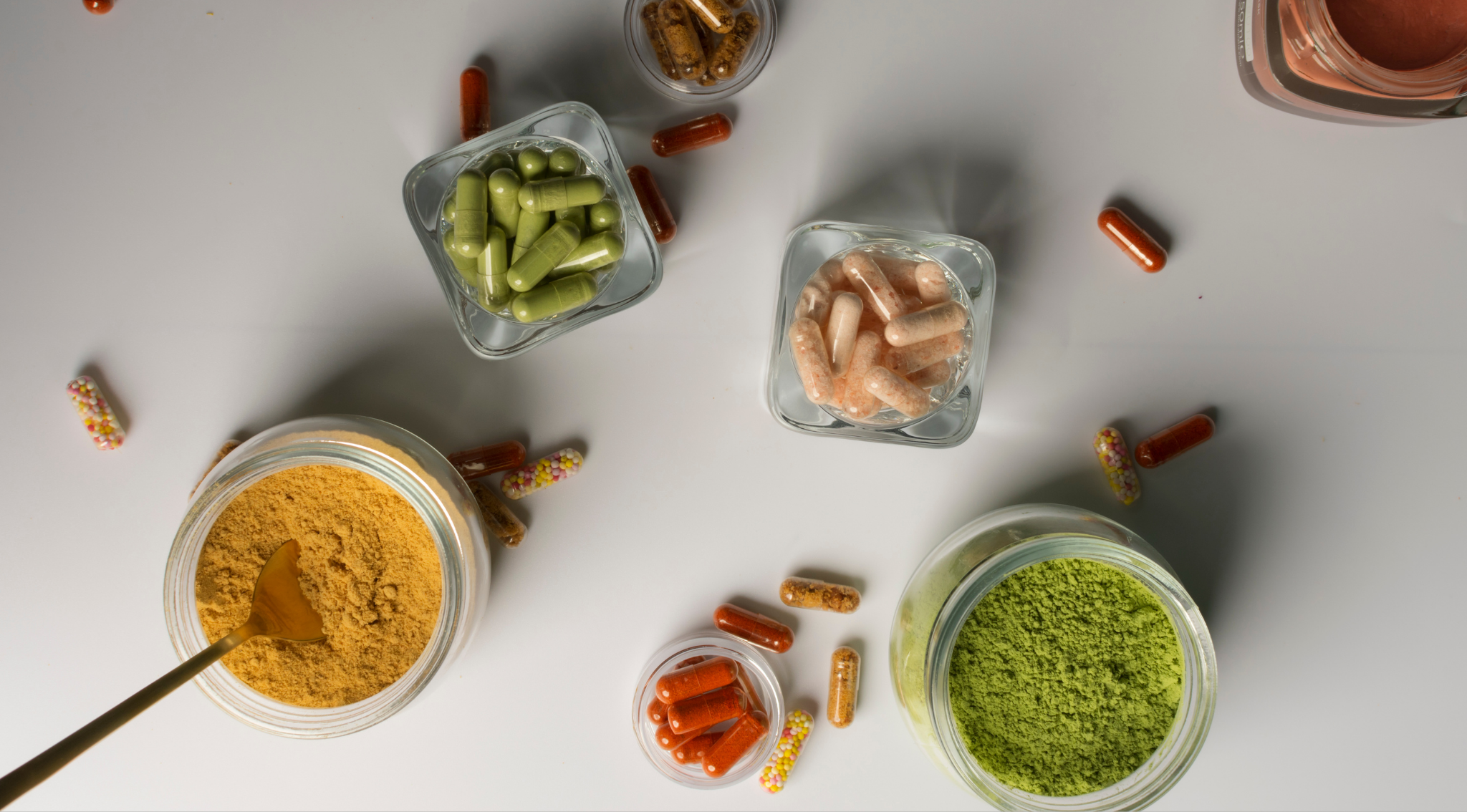The Link Between Nutrition and Mental Wellness

Mental wellness influences how we think, feel, and interact with the world, and is deeply intertwined with our nutritional choices. In this article, we will explore the profound impact that diet and specific nutrients have on our mental health, from the brain-gut axis and neurotransmitter function to hormonal balance and inflammation. We will discuss how a balanced diet, rich in essential nutrients, can enhance cognitive functions and emotional stability, while poor dietary habits might undermine mental health. Additionally, we will examine the roles of targeted supplements which support mental wellness through their unique biochemical properties.
By integrating dietary adjustments, lifestyle modifications, and appropriate supplementation, we aim to provide a comprehensive guide to nurturing mental wellness through scientifically supported natural strategies.
The Role of Nutrition in Mental Wellness
Let’s first understand the relationship between nutrition and the brain and intestines.
The brain-gut connection highlights a fundamental pathway through which nutritional intake affects mental wellness. Neurotransmitters, which govern mood and cognition, are significantly influenced by the gut’s health, where a substantial amount of serotonin is produced. (1, 2)
The gut microbiome, when balanced, promotes efficient digestion and absorption of key nutrients that support neurotransmitter function. Conversely, an imbalanced microbiome can lead to inflammation, often manifesting as mood disturbances or cognitive impairments. (3, 4, 5)
Nutrients that support a healthy microbiome, such as fibers from fruits and vegetables, and probiotics from fermented foods, can enhance this gut-brain interaction, underscoring the critical role of diet in maintaining mental health. (6, 7)
Balanced Diet and Mental Health

A balanced diet rich in a variety of nutrients is crucial for brain health. Vitamins, minerals, antioxidants, and fatty acids play key roles in reducing oxidative stress and inflammation, both of which can adversely affect cognitive functions. (7, 8)
For example, omega-3 fatty acids found in fish and flax seeds are essential for maintaining the fluidity of cell membranes and promoting brain cell communication. Antioxidants from colorful fruits and vegetables help neutralize free radicals, protecting brain cells from damage and supporting overall brain health. Consistently consuming a balanced diet ensures that the brain receives a steady supply of these vital nutrients, supporting cognitive functions and emotional regulation. (7, 9, 10, 11)
Good vs. Bad Eating Habits:
| Beneficial Eating Habits:
Regular consumption of a diverse array of whole foods is crucial for mental wellness. (12) A diet that incorporates whole grains, lean proteins, a variety of vegetables, and healthy fats ensures a steady energy supply and optimal brain function. (13) These foods provide essential nutrients that aid neurotransmitter synthesis and reduce inflammation, directly impacting mood and cognitive clarity. (13) |
Detrimental Eating Habits:
Let’s clarify understanding of processed foods first! Processed foods undergo basic transformations (such as freezing, canning, or adding salt and sugar) primarily for preservation or taste enhancement. These foods can still retain nutritional value; for instance, canned beans and frozen vegetables can be convenient and nutrient-rich if additives are minimal. (14) Ultra-processed foods, on the other hand, contain multiple additives like artificial flavors, colorants, emulsifiers, or high-fructose corn syrup, often transforming their taste, texture, or shelf life far beyond the original ingredients. Examples include snack cakes, sugary cereals, and instant noodles. These products are typically designed to be highly palatable and may contribute to overeating. (15) High intake of ultra-processed foods is linked to systemic inflammation, insulin resistance, and metabolic syndrome, all of which compromise blood sugar control and raise oxidative stress. This stress can disrupt neurotransmitter balance, impairing mood and cognitive clarity. Conversely, minimally processed foods, such as fruits, vegetables, and whole grains, supply vital nutrients and reduce inflammation, thereby supporting both physical and mental well-being. (15, 16) High caffeine intake can also disrupt sleep patterns and exacerbate anxiety, further contributing to mental fatigue and brain fog. (17) |
Deep Dive into Key Supplements and Their Benefits

Below, we take a more detailed look at several natural supplements widely recognized for their potential to support mental wellness. Each supplement exerts its effects through distinct biochemical pathways, helping to balance stress hormones, neurotransmitters, or both.
1. Ashwagandha:
Ashwagandha (Withania somnifera) has been a cornerstone of Ayurvedic medicine for centuries, valued for its “rasayana” properties, meaning it aims to rejuvenate the body and mind. Traditionally used to increase vitality, improve concentration, and alleviate stress, Ashwagandha has gained modern attention for its adaptogenic effects. (18)
Effects on Stress Reduction and Cortisol Control:
Ashwagandha is classified as an adaptogen, meaning it helps the body adapt to physical, emotional, and environmental stressors. It achieves this partly by modulating the hypothalamic-pituitary-adrenal (HPA) axis, which governs the release of cortisol, the primary stress hormone. By maintaining a healthier cortisol rhythm, Ashwagandha can reduce the perception of stress and promote mental clarity. (19, 20)
Scientific Studies and Mental Clarity:
Multiple clinical trials have reported that Ashwagandha supplementation can lower cortisol levels, alleviate anxiety, and improve cognitive performance. In a study published in the Indian Journal of Psychological Medicine, participants taking Ashwagandha showed significant reductions in stress and fatigue, alongside improvements in their overall sense of well-being. (19, 21, 22, 23)
2. Rhodiola Rosea:
Rhodiola Rosea is another well-known adaptogen that thrives in high-altitude, cold environments. It contains active compounds like rosavin and salidroside, which help the body resist stress by stabilizing physiological processes and optimizing energy production. (24)
Combating Fatigue and Enhancing Cognitive Functions:
Research suggests Rhodiola can reduce mental fatigue by improving mitochondrial efficiency, boosting cellular energy production in the brain. This heightened energy availability helps maintain focus, attention, and processing speed, even under stress. (24, 25, 26)
Mood Improvement and Mental Stamina:
Clinical findings indicate that Rhodiola supplementation can positively influence mood and resilience. By modulating neurotransmitters such as serotonin and dopamine, it supports emotional balance and sustains mental stamina during physically or mentally demanding tasks. (25)
3. Magnesium:
Magnesium is crucial in over 300 biochemical reactions, including those tied to nerve transmission and neuromuscular coordination. It regulates ion channels (particularly those for calcium and glutamate) helping maintain balanced excitatory and inhibitory signals within the central nervous system. (27, 28)
Deficiency and Its Impact on Mental Health:
Low magnesium levels are correlated with heightened stress responses, irritability, and anxiety. Chronic deficiency may intensify inflammation and disturb sleep patterns, both of which can degrade cognitive function over time. (29)
Stress Management and Relaxation:
Supplementing with magnesium can restore normal neural function and support the production of inhibitory neurotransmitters, such as GABA. By calming hyperactive neural pathways, magnesium not only eases stress but also promotes more restful sleep, thereby enhancing overall mental clarity. (28, 29)
4. L-Theanine:
L-Theanine, predominantly found in green tea leaves, is valued for its ability to induce relaxation while preserving alertness. It counters the stimulant effect of caffeine by modulating specific neural pathways, ensuring users remain calm yet focused. (30, 31)
Influence on Neurotransmitters:
This amino acid boosts alpha-wave activity in the brain, typically associated with a relaxed yet awake mental state. L-Theanine also increases levels of neurotransmitters such as GABA, serotonin, and dopamine, all of which help regulate mood and stress responses. (32, 33)
Clinical Evidence for Anxiety Reduction and Focus:
Studies have shown that L-Theanine supplementation can lower psychological and physiological markers of stress. When taken regularly, it may improve focus, attention, and cognitive performance, especially during tasks requiring sustained mental effort. (30, 34, 35)
Lifestyle Factors That Complement Nutritional Interventions
While nutritional support is vital for mental wellness, it must be paired with strategic lifestyle choices to achieve lasting benefits. Research shows that regular exercise, sufficient sleep, and mindfulness techniques can further stabilize mood, bolster cognitive function, and optimize the stress response. By integrating these elements with a targeted diet and supplements, individuals can enhance mental resilience and overall well-being.
Holistic Approaches: Nutrition, Exercise, Sleep, and Mindfulness
- Exercise: Engaging in moderate physical activities such as brisk walking, cycling, or resistance training elevates endorphin and dopamine levels, alleviating stress and improving mood. These activities also promote the release of brain-derived neurotrophic factor (BDNF), supporting the growth and maintenance of neural pathways essential for learning and memory. (36, 37, 38)
- Sleep: Adequate rest is vital for memory consolidation and emotional processing. During deep sleep, the glymphatic system helps clear metabolic waste from the brain, preventing cognitive decline. Consistent sleep patterns also regulate neurotransmitters like serotonin and dopamine, stabilizing mood and stress responses. (39, 40)
- Mindfulness: Practices such as meditation, deep breathing, and yoga lower cortisol and modulate the autonomic nervous system. By reducing sympathetic overactivity, mindfulness fosters a calmer, more focused mental state. Over time, these practices can improve stress tolerance, emotional regulation, and overall mental clarity. (41, 42, 43)
Daily routines that combine these practices could look like this:
- Morning: Engage in light stretching or a brief meditation session to set a calm tone for the day. Take adaptogens alongside a balanced breakfast.
- Midday: Incorporate moderate exercise, like a 20-minute brisk walk or gentle yoga, followed by a nutrient-rich lunch to replenish energy and micronutrients.
- Evening: Wind down with mindfulness exercises or gentle reading. Supplement with magnesium for enhanced relaxation and restful sleep.
Bodhe’s recommended supplement for Mental Wellness
UNWIND is a comprehensive formulation designed to address multiple facets of mental wellness and relaxation. It employs adaptogens like Ashwagandha and Rhodiola Rosea to regulate cortisol levels, helping the body better handle stress. Ingredients such as L-Theanine and 5-HTP enhance the production of key neurotransmitters, including serotonin and dopamine, which are critical for mood balance and sleep quality. Meanwhile, GABA and Magnesium work in tandem to calm neuronal excitability, promoting deeper, more restorative rest. A full Vitamin B Complex further supports cellular energy and neurological health, ensuring that both mind and body remain resilient in the face of daily stressors. By targeting these interconnected pathways, UNWIND offers a holistic approach to improving overall mental well-being.
References:
- Appleton J. The Gut-Brain Axis: Influence of Microbiota on Mood and Mental Health. Integr Med (Encinitas). 2018 Aug;17(4):28-32. PMID: 31043907; PMCID: PMC6469458.
- Mitrea L, Nemeş SA, Szabo K, Teleky BE, Vodnar DC. Guts Imbalance Imbalances the Brain: A Review of Gut Microbiota Association With Neurological and Psychiatric Disorders. Front Med (Lausanne). 2022 Mar 31;9:813204. doi: 10.3389/fmed.2022.813204. PMID: 35433746; PMCID: PMC9009523.
- Chen Y, Xu J, Chen Y. Regulation of Neurotransmitters by the Gut Microbiota and Effects on Cognition in Neurological Disorders. Nutrients. 2021 Jun 19;13(6):2099. doi: 10.3390/nu13062099. PMID: 34205336; PMCID: PMC8234057.
- Bamicha, V., Pergantis, P., & Drigas, A. (2024). The Effect of Gut Microbiome, Neurotransmitters, and Digital Insights in Autism. Applied Microbiology, 4(4), 1677-1701. https://doi.org/10.3390/applmicrobiol4040114
- Dalton A, Mermier C, Zuhl M. Exercise influence on the microbiome-gut-brain axis. Gut Microbes. 2019;10(5):555-568. doi: 10.1080/19490976.2018.1562268. Epub 2019 Jan 31. PMID: 30704343; PMCID: PMC6748614.
- Berding K, Vlckova K, Marx W, Schellekens H, Stanton C, Clarke G, Jacka F, Dinan TG, Cryan JF. Diet and the Microbiota-Gut-Brain Axis: Sowing the Seeds of Good Mental Health. Adv Nutr. 2021 Jul 30;12(4):1239-1285. doi: 10.1093/advances/nmaa181. PMID: 33693453; PMCID: PMC8321864.
- Mafe, A. N., Edo, G. I., Majeed, O. S., Gaaz, T. S., Akpoghelie, P. O., Isoje, E. F., Igbuku, U. A., Owheruo, J. O., Opiti, R. A., Garba, Y., Essaghah, A. E. A., Ahmed, D. S., & Umar, H. (2025). A review on probiotics and dietary bioactives: Insights on metabolic well-being, gut microbiota, and inflammatory responses. Food Chemistry Advances, 6, 100919. https://doi.org/10.1016/j.focha.2025.100919
- Puri S, Shaheen M, Grover B. Nutrition and cognitive health: A life course approach. Front Public Health. 2023 Mar 27;11:1023907. doi: 10.3389/fpubh.2023.1023907. PMID: 37050953; PMCID: PMC10083484.
- Dighriri IM, Alsubaie AM, Hakami FM, Hamithi DM, Alshekh MM, Khobrani FA, Dalak FE, Hakami AA, Alsueaadi EH, Alsaawi LS, Alshammari SF, Alqahtani AS, Alawi IA, Aljuaid AA, Tawhari MQ. Effects of Omega-3 Polyunsaturated Fatty Acids on Brain Functions: A Systematic Review. Cureus. 2022 Oct 9;14(10):e30091. doi: 10.7759/cureus.30091. PMID: 36381743; PMCID: PMC9641984.
- Rahaman MM, Hossain R, Herrera-Bravo J, Islam MT, Atolani O, Adeyemi OS, Owolodun OA, Kambizi L, Daştan SD, Calina D, Sharifi-Rad J. Natural antioxidants from some fruits, seeds, foods, natural products, and associated health benefits: An update. Food Sci Nutr. 2023 Jan 13;11(4):1657-1670. doi: 10.1002/fsn3.3217. PMID: 37051367; PMCID: PMC10084981.
- Lobo V, Patil A, Phatak A, Chandra N. Free radicals, antioxidants and functional foods: Impact on human health. Pharmacogn Rev. 2010 Jul;4(8):118-26. doi: 10.4103/0973-7847.70902. PMID: 22228951; PMCID: PMC3249911.
- Esquivel MK. Nutrition Benefits and Considerations for Whole Foods Plant-Based Eating Patterns. Am J Lifestyle Med. 2022 Apr 22;16(3):284-290. doi: 10.1177/15598276221075992. PMID: 35706588; PMCID: PMC9189583.
- Cena H, Calder PC. Defining a Healthy Diet: Evidence for The Role of Contemporary Dietary Patterns in Health and Disease. Nutrients. 2020 Jan 27;12(2):334. doi: 10.3390/nu12020334. PMID: 32012681; PMCID: PMC7071223.
- Weaver CM, Dwyer J, Fulgoni VL 3rd, King JC, Leveille GA, MacDonald RS, Ordovas J, Schnakenberg D. Processed foods: contributions to nutrition. Am J Clin Nutr. 2014 Jun;99(6):1525-42. doi: 10.3945/ajcn.114.089284. Epub 2014 Apr 23. PMID: 24760975; PMCID: PMC6410904.
- Monteiro CA, Cannon G, Levy RB, et al. Ultra-processed foods: what they are and how to identify them. Public Health Nutrition. 2019;22(5):936-941. doi:10.1017/S1368980018003762
- Dos Santos Leffa, P. (2022). Ultra-processed foods. Encyclopedia of Human Nutrition (Fourth Edition), 653-662. https://doi.org/10.1016/B978-0-12-821848-8.00009-3
- McLellan, T. M., Caldwell, J. A., & Lieberman, H. R. (2016). A review of caffeine’s effects on cognitive, physical and occupational performance. Neuroscience & Biobehavioral Reviews, 71, 294-312. https://doi.org/10.1016/j.neubiorev.2016.09.001
- Singh N, Bhalla M, de Jager P, Gilca M. An overview on ashwagandha: a Rasayana (rejuvenator) of Ayurveda. Afr J Tradit Complement Altern Med. 2011;8(5 Suppl):208-13. doi: 10.4314/ajtcam.v8i5S.9. Epub 2011 Jul 3. PMID: 22754076; PMCID: PMC3252722.
- National Institutes of Health (US), Office of Dietary Supplements. Ashwagandha: Is it helpful for stress, anxiety, or sleep? – Health Professional [Internet]. Bethesda (MD): National Institutes of Health; [cited 2025 Feb 15]. Available from: https://ods.od.nih.gov/factsheets/Ashwagandha-HealthProfessional/
- Salve J, Pate S, Debnath K, Langade D. Adaptogenic and Anxiolytic Effects of Ashwagandha Root Extract in Healthy Adults: A Double-blind, Randomized, Placebo-controlled Clinical Study. Cureus. 2019 Dec 25;11(12):e6466. doi: 10.7759/cureus.6466. PMID: 32021735; PMCID: PMC6979308.
- Lopresti AL, Smith SJ, Malvi H, Kodgule R. An investigation into the stress-relieving and pharmacological actions of an ashwagandha (Withania somnifera) extract: A randomized, double-blind, placebo-controlled study. Medicine (Baltimore). 2019 Sep;98(37):e17186. doi: 10.1097/MD.0000000000017186. PMID: 31517876; PMCID: PMC6750292.
- Leonard, M., Dickerson, B., Estes, L., Gonzalez, D. E., Jenkins, V., Johnson, S., Xing, D., Yoo, C., Ko, J., Purpura, M., Jäger, R., Faries, M., Kephart, W., Sowinski, R., Rasmussen, C. J., & Kreider, R. B. (2023). Acute and Repeated Ashwagandha Supplementation Improves Markers of Cognitive Function and Mood. Nutrients, 16(12), 1813. https://doi.org/10.3390/nu16121813
- Kale, S., Lopresti, A., Suri, R., Garg, N., & Langade, D. (2024). Safety and Efficacy of Ashwagandha Root Extract on Cognition, Energy and Mood Problems in Adults: Prospective, Randomized, Placebo-Controlled Study. Journal of Psychoactive Drugs, 1–13. https://doi.org/10.1080/02791072.2024.2424279
- Tinsley GM, Jagim AR, Potter GDM, Garner D, Galpin AJ. Rhodiola rosea as an adaptogen to enhance exercise performance: a review of the literature. Br J Nutr. 2024 Feb 14;131(3):461-473. doi: 10.1017/S0007114523001988. Epub 2023 Aug 29. PMID: 37641937; PMCID: PMC10784128.
- Stojcheva, E. I., & Quintela, J. C. (2022). The Effectiveness of Rhodiola rosea L. Preparations in Alleviating Various Aspects of Life-Stress Symptoms and Stress-Induced Conditions—Encouraging Clinical Evidence. Molecules, 27(12), 3902. https://doi.org/10.3390/molecules27123902
- Koop, Tina & Dienel, Angelika & Heldmann, Marcus & Münte, Thomas. (2020). Effects of a Rhodiola rosea extract on mental resource allocation and attention: An event‐related potential dual task study. Phytotherapy Research. 34. 10.1002/ptr.6778.
- Kirkland AE, Sarlo GL, Holton KF. The Role of Magnesium in Neurological Disorders. Nutrients. 2018 Jun 6;10(6):730. doi: 10.3390/nu10060730. PMID: 29882776; PMCID: PMC6024559.
- Papadopol V, Nechifor M. Magnesium in neuroses and neuroticism. In: Vink R, Nechifor M, editors. Magnesium in the Central Nervous System [Internet]. Adelaide (AU): University of Adelaide Press; 2011. Available from: https://www.ncbi.nlm.nih.gov/books/NBK507254/
- Pickering G, Mazur A, Trousselard M, Bienkowski P, Yaltsewa N, Amessou M, Noah L, Pouteau E. Magnesium Status and Stress: The Vicious Circle Concept Revisited. Nutrients. 2020 Nov 28;12(12):3672. doi: 10.3390/nu12123672. PMID: 33260549; PMCID: PMC7761127.
- Li, Y., Liu, Y., Wu, T., Kenaan, A., Geng, F., Li, B., Gunaratne, A., Li, H., & Gan, Y. (2022). L-Theanine: A Unique Functional Amino Acid in Tea (Camellia sinensis L.) With Multiple Health Benefits and Food Applications. Frontiers in Nutrition, 9, 853846. https://doi.org/10.3389/fnut.2022.853846
- Nguyen, Quoc. (2024). L-Theanine: A Comprehensive Review of Its Mechanisms and Health Benefits.
- Nobre, Anna & Rao, Anling & Owen, Gail. (2008). L-theanine, a natural constituent in tea, and its effect on mental state. Asia Pacific journal of clinical nutrition. 17 Suppl 1. 167-8.
- Mason, Russ. (2001). 200 mg of Zen: L-Theanine Boosts Alpha Waves, Promotes Alert Relaxation. Alternative and Complementary Therapies. 7. 91-95. 10.1089/10762800151125092.
- Kimura, Kenta & Ozeki, Makoto & Juneja, Lekh & Ohira, Hideki. (2007). L-Theanine reduces psychological and physiological stress responses. Biological psychology. 74. 39-45. 10.1016/j.biopsycho.2006.06.006.
- Baba, Y., Inagaki, S., Nakagawa, S., Kaneko, T., Kobayashi, M., & Takihara, T. (2021). Effects of l-Theanine on Cognitive Function in Middle-Aged and Older Subjects: A Randomized Placebo-Controlled Study. Journal of Medicinal Food, 24(4), 333. https://doi.org/10.1089/jmf.2020.4803
- Sleiman SF, Henry J, Al-Haddad R, El Hayek L, Abou Haidar E, Stringer T, Ulja D, Karuppagounder SS, Holson EB, Ratan RR, Ninan I, Chao MV. Exercise promotes the expression of brain derived neurotrophic factor (BDNF) through the action of the ketone body β-hydroxybutyrate. Elife. 2016 Jun 2;5:e15092. doi: 10.7554/eLife.15092. PMID: 27253067; PMCID: PMC4915811.
- Di Liegro CM, Schiera G, Proia P, Di Liegro I. Physical Activity and Brain Health. Genes (Basel). 2019 Sep 17;10(9):720. doi: 10.3390/genes10090720. PMID: 31533339; PMCID: PMC6770965.
- Sanaeifar, F., Pourranjbar, S., Pourranjbar, M., Ramezani, S., Mehr, S. R., Wadan, A. S., & Khazeifard, F. (2024). Beneficial effects of physical exercise on cognitive-behavioral impairments and brain-derived neurotrophic factor alteration in the limbic system induced by neurodegeneration. Experimental Gerontology, 195, 112539. https://doi.org/10.1016/j.exger.2024.112539
- Eugene AR, Masiak J. The Neuroprotective Aspects of Sleep. MEDtube Sci. 2015 Mar;3(1):35-40. PMID: 26594659; PMCID: PMC4651462.
- Voumvourakis, K. I., Sideri, E., Papadimitropoulos, G. N., Tsantzali, I., Hewlett, P., Kitsos, D., Stefanou, M., Bonakis, A., Giannopoulos, S., Tsivgoulis, G., & Paraskevas, G. P. (2023). The Dynamic Relationship between the Glymphatic System, Aging, Memory, and Sleep. Biomedicines, 11(8), 2092. https://doi.org/10.3390/biomedicines11082092
- Pascoe MC, Thompson DR, Ski CF. Yoga, mindfulness-based stress reduction and stress-related physiological measures: A meta-analysis. Psychoneuroendocrinology. 2017 Dec;86:152-168. doi: 10.1016/j.psyneuen.2017.08.008. Epub 2017 Aug 30. PMID: 28963884.
- Hofmann SG, Gómez AF. Mindfulness-Based Interventions for Anxiety and Depression. Psychiatr Clin North Am. 2017 Dec;40(4):739-749. doi: 10.1016/j.psc.2017.08.008. Epub 2017 Sep 18. PMID: 29080597; PMCID: PMC5679245.
- Calderone, A., Latella, D., Impellizzeri, F., De Pasquale, P., Famà, F., Quartarone, A., & Calabrò, R. S. (2024). Neurobiological Changes Induced by Mindfulness and Meditation: A Systematic Review. Biomedicines, 12(11), 2613. https://doi.org/10.3390/biomedicines12112613

